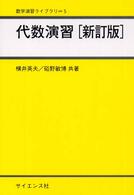- ホーム
- > 洋書
- > 英文書
- > Literary Criticism
基本説明
Powerfully reconnects the study of early American poetry to the broadest currents of literary and cultural criticism.
Full Description
The most widely practiced and read form of verse in America, "elegies are poems about being left behind," writes Max Cavitch. American Elegy is the history of a diverse people's poetic experience of mourning and of mortality's profound challenge to creative living. By telling this history in political, psychological, and aesthetic terms, American Elegy powerfully reconnects the study of early American poetry to the broadest currents of literary and cultural criticism.Cavitch begins by considering eighteenth-century elegists such as Franklin, Bradstreet, Mather, Wheatley, Freneau, and Annis Stockton, highlighting their defiance of boundaries—between public and private, male and female, rational and sentimental—and demonstrating how closely intertwined the work of mourning and the work of nationalism were in the revolutionary era. He then turns to elegy's adaptations during the market-driven Jacksonian age, including more obliquely elegiac poems like those of William Cullen Bryant and the popular child elegies of Emerson, Lydia Sigourney, and others. Devoting unprecedented attention to the early African-American elegy, Cavitch discusses poems written by free blacks and slaves, as well as white abolitionists, seeing in them the development of an African-American genealogical imagination. In addition to a major new reading of Whitman's great elegy for Lincoln, "When Lilacs Last in the Dooryard Bloom'd," Cavitch takes up less familiar passages from Whitman as well as Melville's and Lazarus's poems following Lincoln's death. American Elegy offers critical and often poignant insights into the place of mourning in American culture. Cavitch examines literary responses to historical events—such as the American Revolution, Native American removal, African-American slavery, and the Civil War—and illuminates the states of loss, hope, desire, and love in American studies today.Max Cavitch is assistant professor of English at the University of Pennsylvania.








